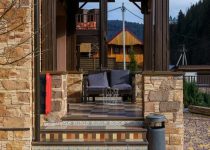How to Remove Rust From Cambridge Pavers
Are you tired of seeing unsightly rust stains on your Cambridge pavers? Don’t worry, removing rust doesn’t have to be a daunting task. In this article, we will show you how to effectively get rid of rust and restore the beauty of your pavers.
With just a few simple steps and some readily available tools, you’ll be able to tackle those stubborn rust stains and prevent them from coming back. Say goodbye to rust and hello to pristine Cambridge pavers!
Understanding the Causes of Rust on Cambridge Pavers
To understand why rust forms on your Cambridge pavers, you should know the main causes of this issue. Rust on pavers can be caused by a variety of factors, such as the presence of iron oxide, water exposure, and the use of certain chemicals.
Iron oxide is the main culprit behind rust formation. When iron particles come into contact with moisture, they undergo a chemical reaction that leads to the formation of rust. This is why pavers that contain iron components are more prone to rusting.
Water exposure is another major cause of rust on Cambridge pavers. When pavers are constantly exposed to water, especially if they are not properly sealed or maintained, it can accelerate the rusting process. Water acts as a catalyst for the oxidation of iron particles, leading to the formation of rust.
Prevention is key when it comes to dealing with rust on Cambridge pavers. One effective way to prevent rust is to apply a protective sealant to the pavers. This sealant acts as a barrier, preventing water from seeping into the pavers and coming into contact with iron particles. Regular maintenance, such as cleaning and removing debris, can also help prevent rust formation.
The long-term effects of rust on Cambridge pavers can be detrimental. Rust can cause discoloration, staining, and even structural damage to the pavers. It can make your outdoor space look unappealing and decrease the overall value of your property. Therefore, it is important to address rust issues promptly and take preventive measures to ensure the longevity and aesthetic appeal of your Cambridge pavers.
Gathering the Necessary Tools and Materials
When it comes to removing rust from your Cambridge pavers, there are a few essential tools that you’ll need.
First, you’ll want to have a wire brush on hand to help scrub away the rust.
Additionally, a pressure washer can be a valuable tool for blasting away any stubborn rust stains.
As for materials, make sure you have a rust remover solution and a bucket for mixing it.
Essential Tools for Removal
The first thing you’ll need is a wire brush to remove rust from Cambridge pavers.
Here are the essential tools for rust removal techniques and preventing rust buildup:
-
Wire brush: Use a wire brush with stiff bristles to scrub away the rust from the pavers. Make sure to choose a brush that is suitable for outdoor use.
-
Rust remover solution: Look for a rust remover solution specifically designed for use on concrete or pavers. Apply the solution to the rusted areas and let it sit for a few minutes before scrubbing with the wire brush.
-
Pressure washer: A pressure washer can help remove stubborn rust stains from the pavers. Use a low-pressure setting to avoid damaging the surface.
-
Protective gloves and goggles: To protect yourself from the rust remover solution and any debris that may come off the pavers, wear gloves and goggles.
Now that you have the necessary tools for rust removal, let’s move on to the materials needed for cleaning.
Materials Needed for Cleaning
Once you have the wire brush, rust remover solution, pressure washer, and protective gear, it’s time to gather the materials needed for cleaning the pavers.
First, you’ll need a bucket or container to mix the rust remover solution. Make sure to follow the instructions on the product for the right dilution ratio.
Next, grab a scrub brush or broom to agitate the solution and remove any remaining rust stains. If you want to be eco-friendly, consider using alternatives like lemon juice or white vinegar mixed with water as a natural rust remover.
Additionally, you may need a hose or water source to rinse off the pavers after cleaning.
Lastly, don’t forget to have a clean cloth or towel on hand for drying the surface once you’re done.
Following these best practices and eco-friendly alternatives, you’ll have clean and rust-free Cambridge pavers in no time.
Preparing the Pavers for Rust Removal
To begin preparing the pavers for rust removal, you’ll need to gather the necessary materials. Here’s what you’ll need:
-
Safety goggles: Protect your eyes from any potential harm while working with rust removal techniques.
-
Wire brush: Use a wire brush to scrub the rusted areas of the pavers. This will help loosen the rust and make it easier to remove.
-
Broom or brush: Sweep away any loose debris or dirt from the pavers before starting the rust removal process.
-
Garden hose or pressure washer: Use a garden hose or pressure washer to rinse off the pavers after scrubbing them with the wire brush. This will help remove any remaining rust particles.
Now that you have gathered the necessary materials, you can begin preparing the pavers for rust removal. Start by putting on your safety goggles to protect your eyes. Then, use the wire brush to scrub the rusted areas of the pavers. Apply firm pressure to remove as much rust as possible.
Once you have finished scrubbing, use a broom or brush to sweep away any loose debris or dirt. Finally, rinse off the pavers using a garden hose or pressure washer to remove any remaining rust particles.
With the pavers prepared, it’s time to move on to the next step: applying a rust remover solution to the affected areas.
Applying a Rust Remover Solution to the Affected Areas
When it comes to removing rust from your pavers, there are a few key points to consider.
First, you need to know the most effective rust removal techniques.
Second, choosing the right solution is crucial for achieving optimal results.
And finally, it’s important to take steps to prevent future rust buildup.
Effective Rust Removal Techniques
There’s no denying that using vinegar and baking soda is an effective way to remove rust from Cambridge pavers. If you’re looking for more rust prevention tips and natural rust removal methods, here are four techniques to consider:
-
Lemon Juice: Squeeze fresh lemon juice onto the rusted areas of your pavers. Let it sit for a few minutes, then scrub with a brush to remove the rust.
-
Potato and Dish Soap: Cut a potato in half and dip it in dish soap. Rub the potato onto the rusted pavers, focusing on the affected areas. Rinse with water and repeat if necessary.
-
Salt and Lime: Sprinkle salt onto the rusted spots and squeeze lime juice over it. Let it sit for a few hours, then scrub with a brush and rinse thoroughly.
-
White Vinegar Soak: Fill a bucket with white vinegar and soak the rusted pavers for a few hours. Scrub the rust away with a brush and rinse with water.
Choosing the Right Solution
If you’re unsure which solution to choose, consider the pros and cons of each rust removal technique.
When it comes to removing rust from Cambridge pavers, there are several alternative rust removal methods available. One approach is to test different rust remover solutions to find the one that works best for your specific situation.
Some common rust remover solutions include vinegar, lemon juice, baking soda, and commercial rust removers. Each solution has its advantages and disadvantages.
For example, vinegar is a natural and inexpensive option, but it may take longer to fully remove the rust. On the other hand, commercial rust removers are often more powerful and effective, but they can be more costly.
Preventing Future Rust Buildup
To prevent future rust buildup, it’s important to regularly clean and seal the surface of your pavers. Here are four steps you can take to ensure long-term rust prevention:
-
Clean the pavers: Use a mild detergent and water to remove any dirt or debris from the surface of the pavers. Scrub gently with a brush or broom to avoid damaging the pavers.
-
Rinse thoroughly: Once the pavers are clean, rinse them thoroughly with water to remove any remaining soap residue.
-
Apply a rust inhibitor: Use a rust inhibitor specifically designed for pavers to prevent rust stains from forming. Follow the instructions on the product label for proper application.
-
Seal the pavers: Finish the process by applying a high-quality sealer to the pavers. This will create a protective barrier that helps prevent rust and other stains from penetrating the surface.
Scrubbing and Rinsing the Pavers to Remove Rust Stains
Start by scrubbing the pavers with a mixture of vinegar and water to remove the rust stains. This solution is effective in breaking down the rust and restoring the beauty of your Cambridge pavers. Apply the mixture generously to the affected areas and scrub with a stiff brush. Make sure to scrub in a circular motion to fully penetrate the rust stains. Once you have scrubbed the pavers, rinse them thoroughly with water to remove any remaining rust residue.
If the rust stains are stubborn and do not come off with vinegar and water, you can consider using a pressure washer. This powerful tool can help blast away the rust stains from the pavers. However, be cautious when using a pressure washer as it can damage the pavers if used incorrectly. Adjust the pressure settings to a moderate level and keep the nozzle at a safe distance from the pavers. Always wear protective gear such as goggles and gloves when operating a pressure washer.
By scrubbing and rinsing the pavers, you have successfully removed the rust stains.
In the next section, we will discuss how to prevent future rust buildup and maintain the beauty of your Cambridge pavers.
Preventing Future Rust and Maintaining the Beauty of Cambridge Pavers
To prevent future rust buildup and maintain the beauty of your pavers, regularly seal them with a protective coating. This simple step will not only keep your pavers looking their best, but it will also provide long-term rust prevention.
Here’s what you need to do:
-
Clean the pavers: Before applying the protective coating, make sure to thoroughly clean the pavers. Remove any dirt, debris, or stains using a mild detergent and a scrub brush. Rinse the pavers with water and allow them to dry completely.
-
Choose the right sealer: There are different types of sealers available, so it’s important to choose one that is suitable for your specific pavers. Look for a sealer that is designed to protect against rust and maintain paver color.
-
Apply the sealer: Follow the manufacturer’s instructions to apply the sealer evenly on the pavers. Use a roller or a brush to ensure proper coverage. Allow the sealer to dry completely before walking or placing any furniture on the pavers.
-
Maintain regular sealing schedule: To ensure long-term rust prevention and maintain the beauty of your pavers, it’s important to reapply the protective coating regularly. Check the manufacturer’s recommendations for the ideal sealing schedule for your specific pavers.
Frequently Asked Questions
Can I Use a Regular Household Cleaner to Remove Rust Stains From Cambridge Pavers?
You can use a regular household cleaner to remove rust stains from Cambridge pavers, but it may not be as effective as using vinegar as a natural rust remover. There are alternative methods to remove rust stains from Cambridge pavers as well.
How Often Should I Apply a Rust Remover Solution to Prevent Future Rust on My Pavers?
To prevent future rust on your pavers, apply a rust remover solution regularly. The frequency depends on factors like weather and how long it takes for rust stains to form on Cambridge pavers.
Can I Use a Pressure Washer to Remove Rust Stains From Cambridge Pavers?
When removing rust stains from Cambridge pavers, using a pressure washer is an option, but there are alternatives. Consider using natural rust removal methods like vinegar, lemon juice, or baking soda.
Are There Any Specific Safety Precautions I Should Take When Using a Rust Remover Solution?
When using a rust remover solution, it’s important to take precautions for your safety. Wear protective gloves and goggles, work in a well-ventilated area, and follow the instructions on the recommended products for best results.
Can I Use Sandpaper to Scrub off Rust Stains From Cambridge Pavers?
You can use sandpaper as an alternative to scrub off rust stains from Cambridge pavers. However, there are other alternative rust removal methods that you can try as well.
Conclusion
In conclusion, removing rust from Cambridge pavers is a straightforward process that can be done with a few simple steps. By understanding the causes of rust, gathering the necessary tools, and applying a rust remover solution, you can effectively remove rust stains from your pavers.
Remember to scrub and rinse the pavers thoroughly to ensure all rust is removed. Finally, taking steps to prevent future rust and regularly maintaining your Cambridge pavers will help keep them looking beautiful for years to come.



